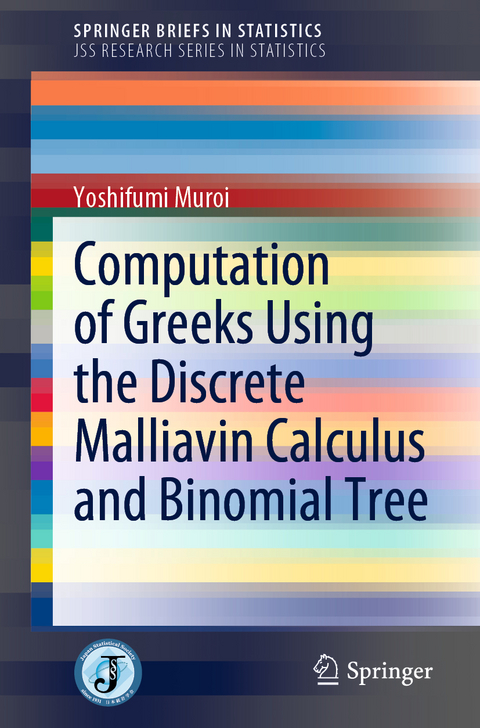
Computation of Greeks Using the Discrete Malliavin Calculus and Binomial Tree
Seiten
2022
|
1st ed. 2022
Springer Verlag, Singapore
9789811910722 (ISBN)
Springer Verlag, Singapore
9789811910722 (ISBN)
This book presents new computation schemes for the sensitivity of options using the binomial tree and introduces readers to the discrete Malliavin calculus. To help readers more easily understand the Malliavin calculus, the book introduces the discrete Malliavin calculus, a theory of the functional for the Bernoulli random walk.
This book presents new computation schemes for the sensitivity of options using the binomial tree and introduces readers to the discrete Malliavin calculus. It also shows that applications of the discrete Malliavin calculus approach to the binomial tree model offer fundamental tools for computing Greeks.
The binomial tree approach is one of the most popular methods in option pricing. Although it is a fairly traditional model for option pricing, it is still widely used in financial institutions since it is tractable and easy to understand. However, the book shows that the tree approach also offers a powerful tool for deriving the Greeks for options. Greeks are quantities that represent the sensitivities of the price of derivative securities with respect to changes in the underlying asset price or parameters.
The Malliavin calculus, the stochastic methods of variations, is one of the most popular tools used to derive Greeks. However, it is also very difficult to understand for most students and practitioners because it is based on complex mathematics. To help readers more easily understand the Malliavin calculus, the book introduces the discrete Malliavin calculus, a theory of the functional for the Bernoulli random walk. The discrete Malliavin calculus is significantly easier to understand, because the functional space of the Bernoulli random walk is realized in a finite dimensional space. As such, it makes this valuable tool far more accessible for a broad readership.
This book presents new computation schemes for the sensitivity of options using the binomial tree and introduces readers to the discrete Malliavin calculus. It also shows that applications of the discrete Malliavin calculus approach to the binomial tree model offer fundamental tools for computing Greeks.
The binomial tree approach is one of the most popular methods in option pricing. Although it is a fairly traditional model for option pricing, it is still widely used in financial institutions since it is tractable and easy to understand. However, the book shows that the tree approach also offers a powerful tool for deriving the Greeks for options. Greeks are quantities that represent the sensitivities of the price of derivative securities with respect to changes in the underlying asset price or parameters.
The Malliavin calculus, the stochastic methods of variations, is one of the most popular tools used to derive Greeks. However, it is also very difficult to understand for most students and practitioners because it is based on complex mathematics. To help readers more easily understand the Malliavin calculus, the book introduces the discrete Malliavin calculus, a theory of the functional for the Bernoulli random walk. The discrete Malliavin calculus is significantly easier to understand, because the functional space of the Bernoulli random walk is realized in a finite dimensional space. As such, it makes this valuable tool far more accessible for a broad readership.
Yoshifumi Muroi, Graduate School of Economics and Management, Tohoku University
Introduction.- Single-Period Model.- Multiple Time Model.- Application to Finance.- Spectral Binomial Tree.- Short Introduction to Malliavin Calculus in Continuous Time Model.- Discrete Malliavin Greeks.
| Erscheinungsdatum | 26.04.2022 |
|---|---|
| Reihe/Serie | JSS Research Series in Statistics | SpringerBriefs in Statistics |
| Zusatzinfo | 5 Illustrations, black and white; VIII, 106 p. 5 illus. |
| Verlagsort | Singapore |
| Sprache | englisch |
| Maße | 155 x 235 mm |
| Themenwelt | Mathematik / Informatik ► Mathematik ► Angewandte Mathematik |
| Mathematik / Informatik ► Mathematik ► Wahrscheinlichkeit / Kombinatorik | |
| Wirtschaft ► Betriebswirtschaft / Management ► Finanzierung | |
| ISBN-13 | 9789811910722 / 9789811910722 |
| Zustand | Neuware |
| Informationen gemäß Produktsicherheitsverordnung (GPSR) | |
| Haben Sie eine Frage zum Produkt? |
Mehr entdecken
aus dem Bereich
aus dem Bereich
für Ingenieure und Naturwissenschaftler
Buch | Softcover (2024)
Springer Vieweg (Verlag)
CHF 48,95
Buch | Softcover (2025)
Springer Vieweg (Verlag)
CHF 62,95
Buch | Softcover (2025)
Springer Fachmedien Wiesbaden (Verlag)
CHF 69,95


